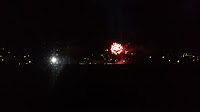31 Dec The Science of Fireworks
Today is New Year’s Eve and while there aren’t any fireworks displays planned for my little town, the nearby ski resort will have a little display. Fortunately, the display is planned early in the evening so my kids and I can see it without staying up past our bedtime.
This is the first year that my kids will see fireworks in the winter.
If your kids are old enough to watch a fireworks display, they might have questions about how fireworks work. I know that my oldest daughter will definitely be curious about how they work. To refresh my memory I’m rewatching the following videos from NPR’s SkunkBear, National Geographic, and Reactions to learn about the science of fireworks.
Today is New Year’s Eve and while there aren’t any fireworks displays planned for my little town, the nearby ski resort will have a little display. Fortunately, the display is planned early in the evening so my kids and I can see it without staying up past our bedtime. This is the first year that my kids will see fireworks in the winter. If your kids are old enough to watch a fireworks display, they might have questions about how fireworks work. I know that my oldest daughter will definitely be curious about how they work. To refresh my memory I’m rewatching the following videos from NPR’s SkunkBear, National Geographic, and Reactions to learn about the science of fireworks.


Sorry, the comment form is closed at this time.